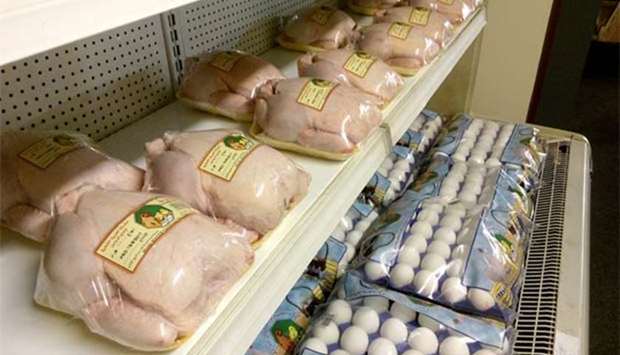Demand for Qatari products will continue even after the ongoing economic blockade on the country is over, with local farms and food manufacturers transforming the crisis into an opportunity to boost sales and expand to wider markets, industry sources have said.
“They will be encouraged to produce more to keep up with the growing market demand. Those who are in the industry will definitely find a market, which could help their businesses grow and expand,” Qatari businessman Farhan al-Sayed told Gulf Times on Sunday.
“Increased demand of local products also translates to increased awareness in the market. The diplomatic crisis has served as a wake-up call because now we have to put more emphasis on food manufacturing and growing local produce,” he pointed out.

Qatari businessman Farhan al-Sayed.
Al-Sayed’s view was echoed by Shanavas PM, LuLu Group International regional manager (Qatar and Egypt), who said “there will be a switchover to support Qatari products.”
“Now is a good time for local food suppliers because they have realised that they should utilise the situation and maximise their presence in the hypermarkets. Even after the embargo, they can still benefit because Qatari and expatriate customers are now aware of these local products. Definitely this will boost sales of local products,” he stressed.
“For Qatari products, we make sure we have them in LuLu whatever is available. There are farms that provide quality produce, which we are getting from them. And this is also part of our efforts to support local farms in Qatar,” Shanavas noted.
A staff of a poultry farm in Qatar said that prior to the Gulf crisis, the company’s daily average for chicken was 33,000 heads, which are delivered to major hypermarkets and other stores in the country. The company also supplies the local market with 360,000 eggs per day.
“We are expecting demand to grow because there is now a vacuum in the market following the blockade on Qatar,” he noted.
Al Meera Consumer Goods Company is also promoting local farm produce in its stores as part of a programme launched in January by the Ministry of Municipality and Environment (MME) Agriculture Affairs Department to market “excellent” Qatari vegetables.
“Many Qatari products have been available in our stores for a long time now. By placing these products on our shelves, this is our way of showing Al Meera’s support to Qatari products,” a source said.
He added: “Because of the blockade following the Gulf diplomatic crisis, we have given these products extra visibility, which translates to better sales for these local companies.”
According to al-Sayed, “there is a need” to invest in local agriculture and to “put more emphasis” on the country’s agro-industry sector, which he described as “very successful.”
“Our farmers need the full support of the local market so they can supply and produce more. The population is increasing, which is why we need more local produce. The manufacturing sector is a very important industry, which is why the authorities must invest more locally in order for us to be self-sufficient,” al-Sayed added.
“Increased demand of local products also translates to increased awareness in the market. The diplomatic crisis has served as a wake-up call because now we have to put more emphasis on food manufacturing and growing local produce,” he pointed out.

Qatari businessman Farhan al-Sayed.
Al-Sayed’s view was echoed by Shanavas PM, LuLu Group International regional manager (Qatar and Egypt), who said “there will be a switchover to support Qatari products.”
“Now is a good time for local food suppliers because they have realised that they should utilise the situation and maximise their presence in the hypermarkets. Even after the embargo, they can still benefit because Qatari and expatriate customers are now aware of these local products. Definitely this will boost sales of local products,” he stressed.
“For Qatari products, we make sure we have them in LuLu whatever is available. There are farms that provide quality produce, which we are getting from them. And this is also part of our efforts to support local farms in Qatar,” Shanavas noted.
A staff of a poultry farm in Qatar said that prior to the Gulf crisis, the company’s daily average for chicken was 33,000 heads, which are delivered to major hypermarkets and other stores in the country. The company also supplies the local market with 360,000 eggs per day.
“We are expecting demand to grow because there is now a vacuum in the market following the blockade on Qatar,” he noted.
Al Meera Consumer Goods Company is also promoting local farm produce in its stores as part of a programme launched in January by the Ministry of Municipality and Environment (MME) Agriculture Affairs Department to market “excellent” Qatari vegetables.
“Many Qatari products have been available in our stores for a long time now. By placing these products on our shelves, this is our way of showing Al Meera’s support to Qatari products,” a source said.
He added: “Because of the blockade following the Gulf diplomatic crisis, we have given these products extra visibility, which translates to better sales for these local companies.”
According to al-Sayed, “there is a need” to invest in local agriculture and to “put more emphasis” on the country’s agro-industry sector, which he described as “very successful.”
“Our farmers need the full support of the local market so they can supply and produce more. The population is increasing, which is why we need more local produce. The manufacturing sector is a very important industry, which is why the authorities must invest more locally in order for us to be self-sufficient,” al-Sayed added.


